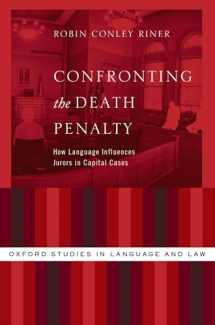
Confronting the Death Penalty: How Language Influences Jurors in Capital Cases (Oxford Studies in Language and Law)
Book details
Summary
Description
Confronting the Death Penalty: How Language Influences Jurors in Capital Cases probes how jurors make the ultimate decision about whether another human being should live or die. Drawing on ethnographic and qualitative linguistic methods, this book explores the means through which languagehelps to make death penalty decisions possible - how specific linguistic choices mediate and restrict jurors', attorneys', and judges' actions and experiences while serving and reflecting on capital trials.The analysis draws on fifteen months of ethnographic fieldwork in diverse counties across Texas, including participant observation in four capital trials and post-verdict interviews with the jurors who decided those cases. Given the impossibility of access to actual capital jury deliberations, thisintegration of methods aims to provide the clearest possible window into jurors' decision-making. Using methods from linguistic anthropology, conversation analysis, and multi-modal discourse analysis, Conley analyzes interviews, trial talk, and written legal language to reveal a variety ofcommunicative practices through which jurors dehumanize defendants and thus judge them to be deserving of death.By focusing on how language can both facilitate and stymie empathic encounters, the book addresses a conflict inherent to death penalty trials: jurors literally face defendants during trial and then must distort, diminish, or negate these face-to-face interactions in order to sentence those samedefendants to death. The book reveals that jurors cite legal ideologies of rational, dispassionate decision-making - conveyed in the form of authoritative legal language - when negotiating these moral conflicts. By investigating the interface between experiential and linguistic aspects of legaldecision-making, the book breaks new ground in studies of law and language, language and psychology, and the death penalty.


We would LOVE it if you could help us and other readers by reviewing the book
Book review



